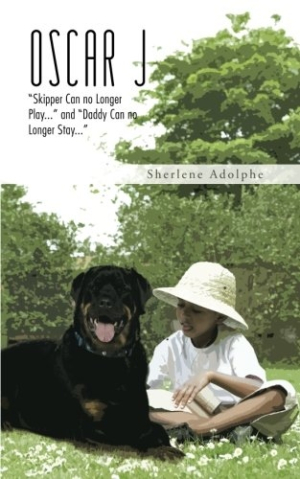
Oscar J
"Skipper Can No Longer Play..." and "Daddy Can No Longer Stay..."
Oscar J is a heartfelt acknowledgment of the struggle and volatile emotions that may accompany the death of a pet or the separation of parents.
Created with the intention of comforting children and young adolescents through some of life’s disheartening circumstances, Oscar J by Sherlene Adolphe is a duet of short stories in mixed verse that offer help and hope as one young boy deals with two very different kinds of loss.
In “Skipper Can No Longer Play,” Oscar J is heartbroken when his beloved dog passes away, but with a little help from his mum, he learns to cherish all of the wonderful memories they shared together. Then, in “Daddy Can No Longer Stay,” his parents’ fighting and their eventual decision to divorce leave Oscar feeling confused, angry, and insecure.
Although both short stories are centered around somber situations, Oscar J maintains a compassionate and upbeat tone throughout, suitable for younger children and teens alike. Oscar himself, described by his mum as a “pre-teen,” vacillates between childish outbursts and sullen teenage behavior, making him a believable and highly accessible representation of both age groups.
The focal point of each story is a single, troubling issue—first death, then divorce—akin to an abbreviated children’s version of the popular problem novel. Oscar J and his parents remain shadowy, partially developed characters and the settings are described in only the vaguest terms, giving young audiences the freedom to imagine the people and places most relevant to their own personal experiences and cultures. Likewise, the plots revolve entirely around how Oscar J works through the acceptance of both situations and are driven by his musings and conversation.
A glossary of terms and definitions appears at the finish of each story, with a variety of seemingly random words chosen for inclusion. The first seems geared more toward nursery-aged children, with words like “Frisbee,” “meadow,” and “vet” appearing alongside the weightier “death” and “spirit.” Meanwhile, the second focuses on emotions such as “despair,” “disrespect,” and “ashamed,” making it an excellent tool for engaging children in an exploration of feelings.
From alternate rhymes to enclosed rhymes, couplets, and irregular single lines, each stanza differs in length and meter, making the rhythm disjointed and the structure forced at times. However, the free style gives Oscar a unique, youthful voice, and the lyrical quality adds to the lightness, in contrast to the somber themes. This is particularly evident in the discussion Oscar has with his mum and dad wherein they officially announce that they will no longer live together: “Mummy now that daddy is going, / Does it mean you will go too? / If I don’t have a mummy or dad then what will I do? / As I’m not near old enough to try and live alone, / Will I get taken by the social and put into a home?”
Opening the door for emotional healing, Adolphe’s Oscar J is a heartfelt acknowledgment of the struggle and volatile emotions that may accompany the death of a pet or the separation of parents. The book focuses on the child’s needs and perspective with riotous rhymes and free-flowing verses that emphasize the bright side.
Reviewed by
Pallas Gates McCorquodale
Disclosure: This article is not an endorsement, but a review. The publisher of this book provided free copies of the book and paid a small fee to have their book reviewed by a professional reviewer. Foreword Reviews and Clarion Reviews make no guarantee that the publisher will receive a positive review. Foreword Magazine, Inc. is disclosing this in accordance with the Federal Trade Commission’s 16 CFR, Part 255.
